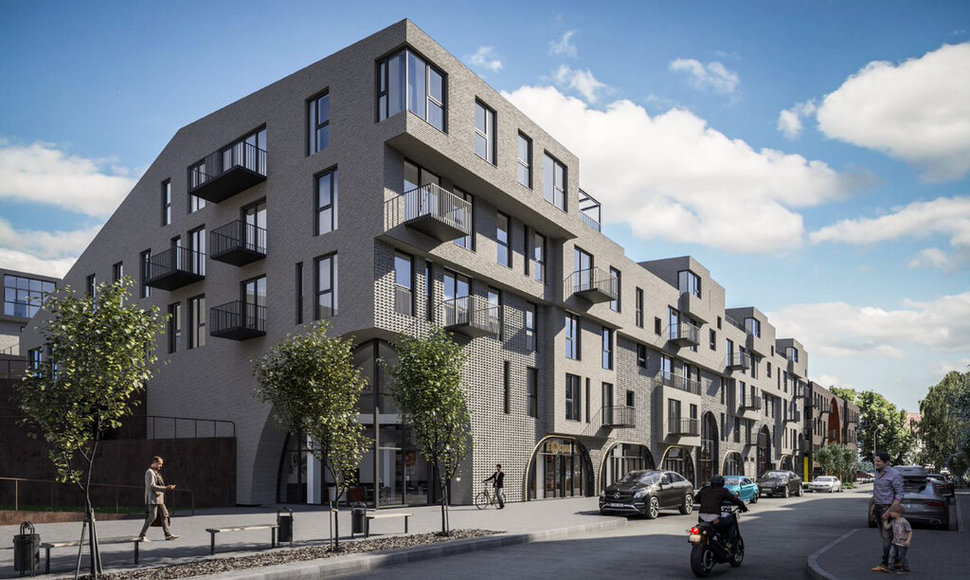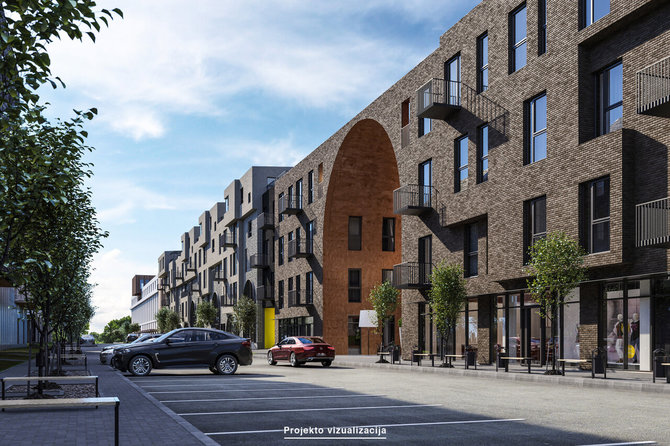“We often buy a home for life, but also as premises for investment. It is often more expensive and relevant for a smaller circle of people, but after talking to investors, they assure that it is usually premises that are the class of property they would like to eventually invest in,” says Aurimas Astramskas, the head of the real estate company Solid Real Advisors.
According to Astramskas, the commercial purpose premises property category includes office, administrative, manufacturing and catering premises. Upon purchase, investors seek to make use of them as effectively as possible, often diversifying the purpose of the premises as per their type of activity, and seeking to spread out risks.
Mantas Mikalauskas, analyst at one of Lithuania’s largest residential, working and leisure space creating companies Darnu Group, says that in the reviving Vilnius Old Town area of Paupys, around 50 per cent of commercial premises are purchased precisely with the aim of investing. According to the analyst, compared to investment in apartment letting, commercial premises have their advantages.
“One of the most important advantages is the duration of the letting contract. On the market, it is usually set to a period of 3-5 years, unlike with residential properties where the change in tenants is far more frequent. Furthermore, the cost of furnishing commercial property usually lands on the tenant, and so the investment returns become even more favourable for the letter,” says M. Mikalauskas.
In Paupys, there are over 5,000 square metres of commercial purpose premises for sale. Premises of this type are usually bought out faster than residential space, and commercial purpose premises are all sold out in the blocks that have already been built, with offers only remaining in the first floors of buildings still under construction.
Historically, it has developed in a way that at the moment, most commercial premises are concentrated in shopping centres. Buildings that began to rise up since 2004-2006 in Vilnius comprise more than 300 square metres of rented space.
“It must be understood that currently, stores found in shopping centres were previously settled in somewhere in the Old Town. Back then, retailers weren’t really considering the opportunity to once again open in separate premises in the city centre,” A. Astramskas explained.
However, this situation is apparently gradually beginning to change, and increasing numbers of businesses are once more moving into the city centre.
Pandemic adjusts priorities
According to A. Astramskas, those looking for commercial premises are well aware that the success of a business is closely tied to its location. And while it is often thought that in most cases, the most effective solution is to seek a location under the wing of a shopping centre, the pandemic period has displayed another side of such retailer development.
Businesses choosing premises closer to the city centre won out during the pandemic, – possibly due to having separate entrances, they were able to receive clients, manage their flow of customers, and have individual working hours that were not tied to those of a shopping centre.
“It appears that this model will become a massive advantage for most businesses in the future. We can already see that when looking for commercial premises, clients are more keenly interested in whether the premises have separate entrances – this is becoming significantly more pertinent than before,” the expert noted.
He believes that if premises are rented out in the third floor of a shopping centre, which is closed due to the lockdown, he can do nothing to help his client. Meanwhile, if operating in premises with a separate entrance, client registration can be performed, a single individual at a time can be allowed in, and premises can be ventilated, with all this ensuring more safety. “Not all goods or services can move to online sales platforms. And so the possibility of functioning autonomously has lately become an especially important criterion for businesses choosing their premises,” A. Astramskas said.
Boutiques thrive in the Old Town
He assures that the Old Town is an especially appealing location for various boutiques – in the heart of the city, various small and stylish stores, bakeries, ecological goods shops, and salons offering various services thrive the most.
“Such spaces are chosen by a narrower range of business-oriented to unique concepts, who are seeking a more individualistic location regardless of whether they operate in the catering, retail, services, or another sector. In such a case, it is not only content that is important, but also form – the environment has a large impact on the combined atmosphere and client sector. You can also highlight one particularly notable group of suppliers here – those offering beauty services, for whom a more discrete and unique environment is important,” A. Astramskas said.
The decision to seek premises in the city centre is further supported by a growing general trend of choosing smaller commercial spaces. This apparently applies in both the retail and service sectors, as well as for catering establishments. “Spaces are clearly contracting, efforts are made to make effective use of them. If five years ago, a restaurant was seeking 200-300 square metres of premises, they now look to fit in 100-225 square metres. Furthermore, clients want to distance themselves from the restaurant or cafe chain format. As they say it themselves, they want something cosier, more individualistic,” A. Astramskas said.
According to the Darnu Group analyst, the trend to move into independent premises in the city centre was already emerging even before the pandemic. One of them is the increased popularity of niche goods stores, which also seek exceptional locations.
Another reason is tied to historically developed shopping centre policies – it is rather difficult to enter a shopping centre for new tenants. According to M. Mikalauskas, vacancy levels are especially low, and so shopping centre managers gain strength under such circumstances. “Looking from the perspective of letting prices, tenants must also cover marketing taxes, a part of the general-use premise maintenance and technical maintenance costs. Frequently, it is also necessary to pay a turnover tax to the shopping centre managers,” he said.














